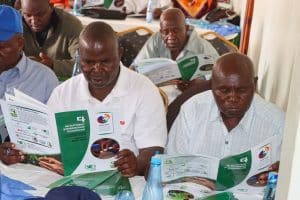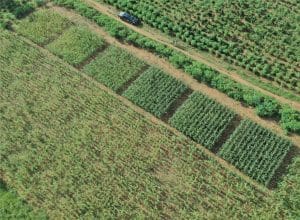The 4R Nutrient Stewardship Project stands as a beacon of transformative change in smallholder farming systems. With a mission to empower smallholder farmers, particularly women on best crop and nutrient management practices, the project integrates gender-sensitive 4R principles into agricultural practices and policies while promoting sustainable crop production. Through targeted initiatives, the project has successfully enhanced socio-economic well-being and environmental stewardship across the region.
The project is a collaborative effort between Global Affairs Canada, the Co-operative Development Foundation of Canada (CDF Canada), Fertilizer Canada, the African Plant Nutrition Institute (APNI), and local partners in Ethiopia, Ghana, and Senegal.

Extension agents using guidebooks developed under the 4R Project.
At the onset of the the 4R Nutrient Stewardship Project, extensive agronomic and socio-economic surveys were conducted during the 2020 growing season. Through these surveys, the project gained a deeper understanding of the typical agronomic and socio-economic dynamics within smallholder farming households in the project implementation areas. This included an assessment of typical crop and nutrient management practices, identifying the prevailing gender roles within these agricultural systems, and pinpointing the major constraints to crop productivity at the farm level. The aim was clear: to empower smallholder farmers in these regions to enhance crop productivity across various cropping systems, including maize, groundnut, soybean, teff, wheat, and rice. With this goal in mind, the project embarked on a thorough examination of key crop and nutrient management factors hindering productivity.
The insights gleaned from these surveys formed the foundation for planned interventions aimed at addressing identified challenges. These interventions took various forms, including on-farm experiments designs to assess key limiting nutrients, farmer, and extension training programs, the development of tailored training guides for both farmers and extension agents, and the establishment of farmer learning/demonstration sites rooted in the principles of 4R nutrient stewardship. By aligning interventions with the specific needs and realities uncovered by the surveys, the project ensured its efforts were targeted, effective, and responsive to the unique contexts of each region.
Recognizing the challenges of low soil fertility and imbalanced and low nutrient applications on crop yields, the agronomic component of the 4R project, led by APNI, designed on-farm Nutrient Omission Trials (NOTs) that identified and quantified the main nutrients that are limiting yields of key crops. NOTs were established for maize and rice in Ghana and wheat and teff in Ethiopia. In addition to NOTs, 4R demonstration sites for maize, soybean, and groundnut in Ghana, wheat and teff in Ethiopia, and for maize and rice in Senegal were established to try locally adapted 4R practices and for farmer training on the 4Rs. Findings from these trials would develop improved fertilizer recommendations that maximize yields while preserving soil fertility and safeguarding the environment. Guidelines for establishing and managing NOTs were meticulously crafted, ensuring representation of diverse farm conditions within the project areas. With close collaboration with local research institutions, the project facilitated participatory evaluation of crop performance and the adaptation of best practices to local contexts.
In Ghana, collaborative efforts with the Savanna Agricultural Research Institute (SARI) led to the establishment of on-farm s for maize and rice, which are major cereal crops in Northern Ghana. In Ethiopia’s Amhara region, the project collaborated with the Debre Birhan Agricultural Research Center (DBARC), an affiliate of the Amhara Regional Agricultural Research Institute (ARARI) to establish on-farm NOTs for wheat and teff, which are the major cereal crops in the project area.

An example of a 4R nutrient omission trial, which assesses key nutrients that are limiting maize yields in Northern Ghana.
Rigorous site selection ensured representation of local farming conditions, while the establishment of 4R learning sites served as pivotal hubs for demonstrating and evaluating best practices in crop and fertilizer management. These initiatives facilitated continuous adaptation to local conditions and bolstered farmer adoption, with resulting insights laying the groundwork for enhanced, site-specific fertilizer recommendations aimed at sustaining crop productivity.
Following the surveys and subsequent trials conducted across the three countries, tailored training guides for farmers and extension workers were developed in the English, French, and Amharic languages for groundnut, soybean, rice, wheat, and maize. The development of these training guides was informed by the results of surveys, experimental trials, literature reviews, and consultations with local experts. Additionally, an e-learning platform was developed to provide courses on 4R Nutrient Stewardship for extension agents and other agriculture enthusiasts across Africa.
The 4R Nutrient Stewardship project exemplifies the power of collaborative action in driving sustainable agricultural development. By harnessing innovative approaches, integrating local knowledge, and promoting gender equality, the project paves the way for a brighter, more sustainable future for smallholder farmers across Africa.